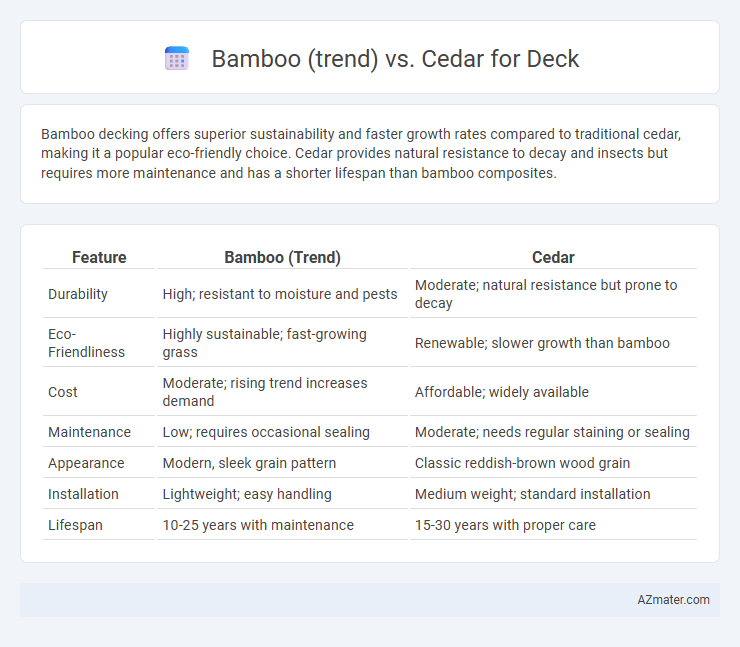Bamboo decking offers superior sustainability and faster growth rates compared to traditional cedar, making it a popular eco-friendly choice. Cedar provides natural resistance to decay and insects but requires more maintenance and has a shorter lifespan than bamboo composites.
Table of Comparison
| Feature | Bamboo (Trend) | Cedar |
|---|---|---|
| Durability | High; resistant to moisture and pests | Moderate; natural resistance but prone to decay |
| Eco-Friendliness | Highly sustainable; fast-growing grass | Renewable; slower growth than bamboo |
| Cost | Moderate; rising trend increases demand | Affordable; widely available |
| Maintenance | Low; requires occasional sealing | Moderate; needs regular staining or sealing |
| Appearance | Modern, sleek grain pattern | Classic reddish-brown wood grain |
| Installation | Lightweight; easy handling | Medium weight; standard installation |
| Lifespan | 10-25 years with maintenance | 15-30 years with proper care |
Bamboo Decking: A Rising Trend Explained
Bamboo decking is gaining popularity for its sustainability, rapid growth rate, and natural resistance to pests and moisture, making it an eco-friendly alternative to traditional cedar. Unlike cedar, bamboo offers superior hardness and durability, resisting warping and cracking over time while delivering a unique, modern aesthetic. Its cost-effectiveness and low maintenance requirements further boost bamboo as a preferred choice for contemporary outdoor decking projects.
Cedar Decking: Timeless Classic for Outdoor Spaces
Cedar decking remains a timeless classic for outdoor spaces due to its natural resistance to rot, decay, and insect damage, making it a durable choice for long-lasting decks. Unlike bamboo, cedar offers a rich, warm aesthetic that weathers gracefully, developing a beautiful silver-gray patina over time without sacrificing strength or stability. Homeowners favor cedar for its low maintenance requirements and its ability to maintain structural integrity in various climates, ensuring a reliable and elegant outdoor deck.
Durability Comparison: Bamboo vs Cedar
Bamboo decking offers exceptional durability with a Janka hardness rating of 1,380, making it more resistant to dents and scratches compared to cedar's rating of 350. Cedar is naturally resistant to rot and insects due to its oils but may require more frequent maintenance to prevent weathering and decay. Bamboo's dense, fibrous structure provides superior strength and longevity, ideal for high-traffic areas, while cedar's softness and natural resilience appeal for aesthetic warmth and moderate durability.
Eco-Friendliness: Sustainability of Bamboo and Cedar
Bamboo decking offers exceptional eco-friendliness due to its rapid growth rate and ability to regenerate without replanting, making it a highly sustainable option compared to traditional woods. Cedar is naturally resistant to rot and insects, which reduces the need for chemical treatments and extends its lifespan, contributing to its environmental benefits. Both materials provide sustainable decking choices, but bamboo's fast renewability and lower environmental impact during harvesting make it a leading green option.
Cost Analysis: Bamboo Decks vs Cedar Decks
Bamboo decks typically cost between $8 and $12 per square foot, offering a more affordable option compared to cedar decks that average $12 to $18 per square foot. Bamboo's rapid growth and sustainable harvesting result in lower material costs, while cedar's natural resistance to rot and insects can reduce long-term maintenance expenses. Evaluating initial investment alongside longevity and upkeep reveals bamboo decks as cost-effective for budget-conscious projects, whereas cedar decks may provide better value through durability over time.
Maintenance Requirements: Bamboo vs Cedar Decking
Bamboo decking demands regular sealing every 1-2 years to maintain water resistance and prevent mold, whereas cedar requires annual staining or sealing to protect against rot and UV damage. Bamboo is highly resistant to insects and moisture but can show wear faster in high-traffic areas without proper upkeep. Cedar naturally contains oils that repel insects, yet it needs consistent maintenance to preserve its color and structural integrity over time.
Aesthetic Appeal: Visual Differences Between Bamboo and Cedar
Bamboo decks showcase a sleek, modern aesthetic with a consistent grain and smooth texture, offering a contemporary appeal with light to medium brown hues that age gracefully into a silvery patina. Cedar decks exhibit a rich, warm appearance characterized by natural knots and varying red to reddish-brown tones, providing a traditional, rustic charm with inherent texture and depth. The visual differences between bamboo and cedar decks cater to distinct design preferences, with bamboo favoring uniformity and minimalism, while cedar embraces natural imperfections and vintage warmth.
Installation Process: Bamboo Deck Boards vs Cedar Planks
Bamboo deck boards offer a straightforward installation process, often featuring pre-finished, uniform planks that fit together seamlessly with hidden fasteners, reducing labor time compared to cedar planks. Cedar planks require careful handling due to their natural variability in size and shape, necessitating pre-drilling and the use of corrosion-resistant screws to prevent splitting and ensure longevity. Bamboo's engineered stability minimizes warping and splitting during installation, while cedar demands precise spacing to accommodate natural expansion and contraction.
Weather Resistance: Performance of Bamboo and Cedar Outdoors
Bamboo decking demonstrates excellent weather resistance due to its natural silica content, which enhances durability against moisture, insects, and decay, making it suitable for humid or rainy climates. Cedar, rich in natural oils and tannins, provides strong resistance to rot, insect damage, and UV exposure but may require regular maintenance to maintain its protective qualities in harsh weather conditions. Both materials perform well outdoors, but bamboo offers superior hardness and dimensional stability, while cedar's weather resilience improves significantly with proper sealing and treatment.
Which Decking is Right for You: Bamboo or Cedar?
Bamboo decking offers exceptional durability, sustainability, and resistance to insects and moisture, making it a low-maintenance choice ideal for eco-conscious homeowners. Cedar decking provides natural beauty, excellent dimensional stability, and inherent resistance to decay, perfect for those valuing classic aesthetics and moderate upkeep. Choosing between bamboo and cedar depends on your priority for eco-friendliness, maintenance levels, and desired longevity in outdoor decking materials.

Infographic: Bamboo (trend) vs Cedar for Deck
 azmater.com
azmater.com